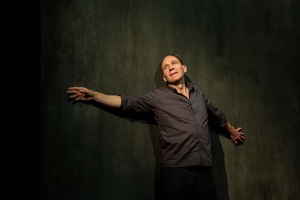Review: FOUR QUARTETS, Harold Pinter Theatre
T.S. Eliot's philosophical examination of humankind and its struggle end up making for an intellectually sophisticated trip to the theatre.

![]() Other than being the source material for the plotless musical Cats and its equally abysmal film, T. S. Eliot was a prolific poet and writer. But the cute but posthumously rendered horrifying felines of his writings have nothing to do with the depths of his reflections on the human race of Four Quartets, which are now brought to the stage again after a previous run in Bath by former evil wizard Ralph Fiennes.
Other than being the source material for the plotless musical Cats and its equally abysmal film, T. S. Eliot was a prolific poet and writer. But the cute but posthumously rendered horrifying felines of his writings have nothing to do with the depths of his reflections on the human race of Four Quartets, which are now brought to the stage again after a previous run in Bath by former evil wizard Ralph Fiennes.
Written and published at the height of World War Two for the most part, Eliot's poems are a philosophical examination of humankind and its struggle end up making for an intellectually sophisticated trip to the theatre. While Fiennes's venture is being sold as a big West End event with its limited run and big name attached, the Harold Pinter is small enough for it to feel as intimate as it should.
With the actor featuring twice on the bill as performer and director, though, this is very much a humongous vanity project that - fortunately - also has depth and artistic value. Besides being a true testament to Fiennes's memory and stamina (the combined poems come to just shy of 1000 lines, and those don't memorise themselves), he highlights the pure elegance and refinement of Eliot's writing.
He stands alone, barefooted; behind him, two giant slabs of stone (think Ten Commandments) lend a solemn aura as he begins his monologue. While his name is sure to attract the fair share of recognition he deserves, Tim Lutkin's lighting design is the star of the show and an equal protagonist.
From tonal shifts to chiaroscuros and from stark shadow play to deep warmth, the chromatic changes in the production carry Fiennes's performance with absolute beauty. His exceptional contribution doesn't end at the confines of the stage, and the house lights come to especially affecting use over two moments particularly. Pitch black envelops the audience as Fiennes's voice comes through from the smooth evenness of a microphone, while later soft lights go up in "Sudden illumination" creating a visceral contrast with the earlier transition.
Throughout the show, there seems to be somewhat of a debate between Fiennes the actor and Fiennes the director, with the latter tying the former's hands slightly. His disenchantment and disillusionment with the world are permanent presences in his delivery, but, as his characters dive deeper into their reflections, they morph into the same performance. He juggles existentialism and nihilism in his musings on time, religion, tradition, and man's relationship with the universe, starting with clearly defines personas who dwindle down to the same man (who might as well be Fiennes himself) as they progress.
It feels like a special affair to be witnessing such a great actor perform a piece of this stature. While it might have its slip-ups and it's far from being perfect, it's impossible to come out of it with a disengaged mind. Eliot's poetry is still as relevant 80-ish years after its publication, and Fiennes makes sure it will stay with his audience for a while longer.
Four Quartets runs at the Harold Pinter Theatre for a limited engagement until 18 December.
Photo credit: Matt Humphrey
Reader Reviews
Videos

